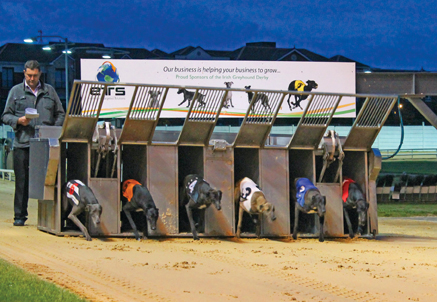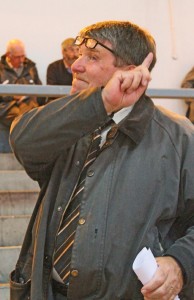
As with all things in life, Shelbourne Park has changed somewhat throughout the years. The former football ground, beside the Dodder River, is now better known for the noble sport of greyhound racing than goal scoring. Yet this sport has brought about its own changes to the Ringsend venue.
For almost a quarter of a century, Doc O’Connor has been regularly tic tacking, a language of hand and arm movements used to signal changing odds in trackside betting – the tracks of Dublin’s greyhound circuits. Trackside bookmaking is something Doc (or “The Doc” as he is known locally) has always wanted to do. “I’ve loved the excitement and thrill of it since I was a young fella,” states the now 60-year-old.
A familiar face at horse racing festivals in Galway, Leopardstown and The Curragh, the Ringsend native feels that, since the Celtic Tiger years, changes imposed by the country’s gambling legislators have become overly severe. “They brought in all these new regulations where you have to pay for everything,” Doc says, “Even if you didn’t go to meetings, you’d have to pay to keep your stall.” The economic downturn has resulted in Doc scaling down his business interests following a massive fall in revenue.
At the height of the Celtic Tiger, Doc had seven-figure annual turnovers, which he says quickly fell once recession hit. “I bought a pitch (stall) a good few years ago and sold it for the same €90,000 I’d paid for it,” he says, “You’d be lucky if you got €10,000 today with the way the business has gone.”

Recent redevelopments at Shelbourne Park and Harold’s Cross haven’t been favourable for the trackside bookies. The stands at the renovated greyhound stadium have been redeveloped to cater for more upmarket clients, groups and families. New features include package deals for group bookings, along with family-orientated evenings. The new enticements to pull in the crowds include silver-service style dining, with complimentary tableside betting facilities. Punters don’t even have to worry about the weather, as races are televised live and broadcast to monitors around the glass-housed stand. “That was the downfall for me, really,” Doc says, “Families are now bringing their kids because they don’t have to hire babysitters, so they can have a meal and a few drinks.”
Other than the fact he was born and bred in Ringsend, Doc believes there was a major personal preference to Shelbourne over Dublin’s other big greyhound stadium at Harold’s Cross. “The short distance to travel was hugely beneficial during the good days,” he says, “Your pitch was in competition against other bookies, so the bigger race cards meant you had to get to Shelbourne earlier, but in later years there were just three of us there.”
Doc notes a distinct difference between Shelbourne and the Harold’s Cross track. “Shelbourne is for Dublin people, in so far as it’s Dublin dogs and Dublin trainers,” he says, “Harold’s Cross tends to be more countrywide.”
Settling into retirement for Doc O’Connor appears easy, but he admits he does “miss it big time”. He recalls one practice that happened a number of times while trackside, when a couple of paid lads could fix a race by throwing clothing at leading dogs as they approached the turns. “Things like that were gas, although not for the owners or backers,” he says, “I do miss it.”
Pictured from top: Paul Sharpe of the Bernard Barry Firm signals 8-1 in Tic Tac Langauge; And they’re off!
By Eric Murphy

